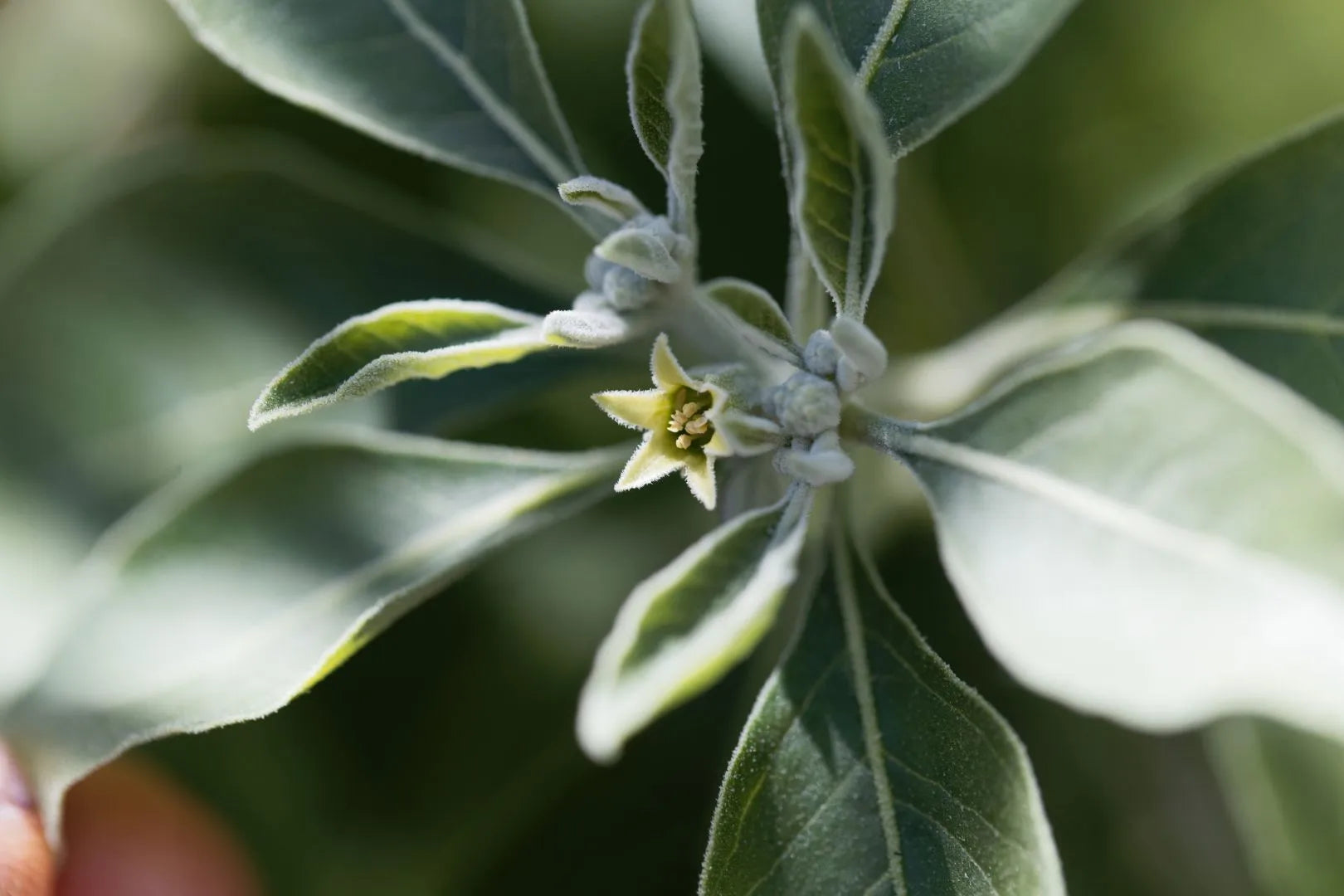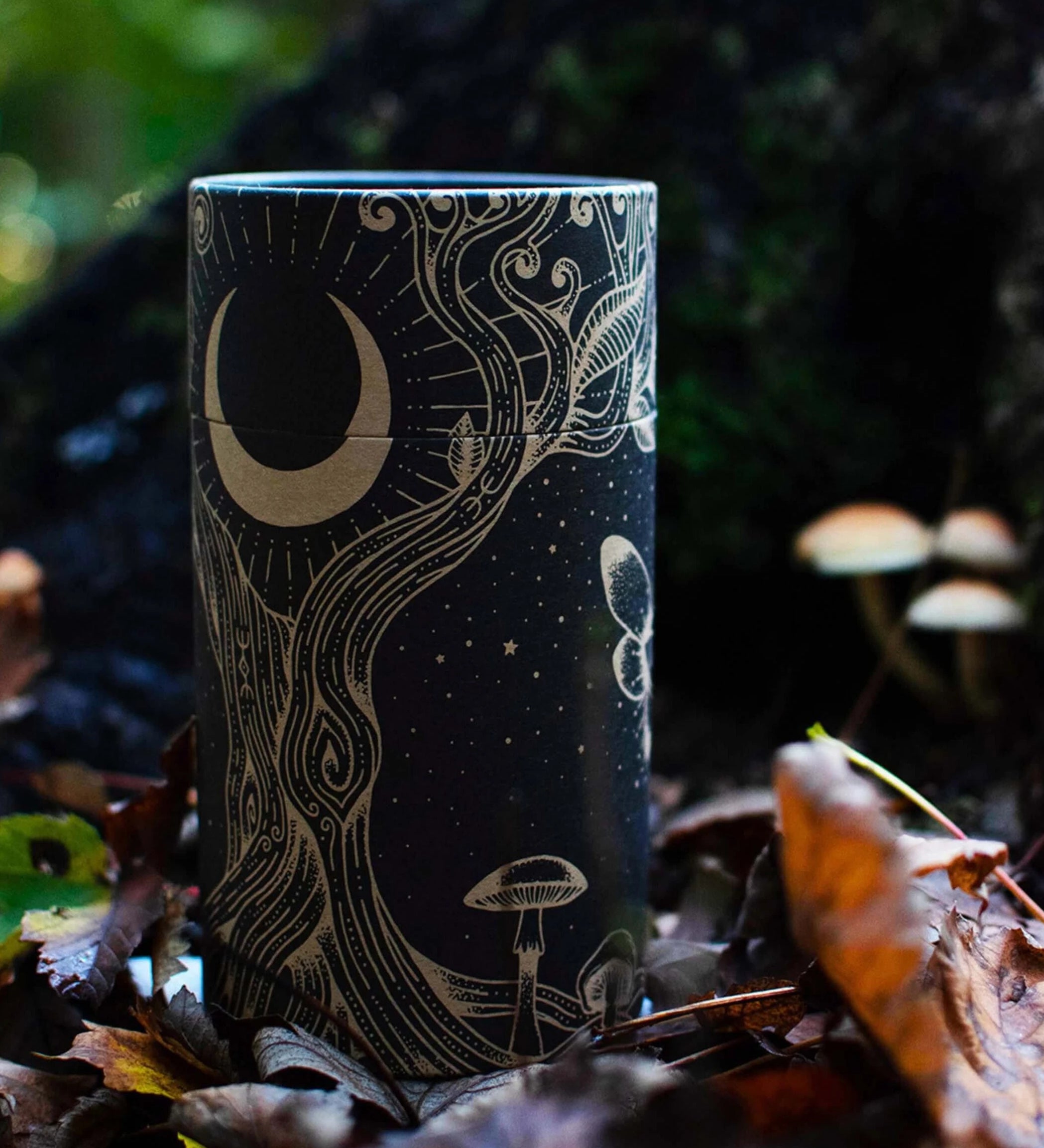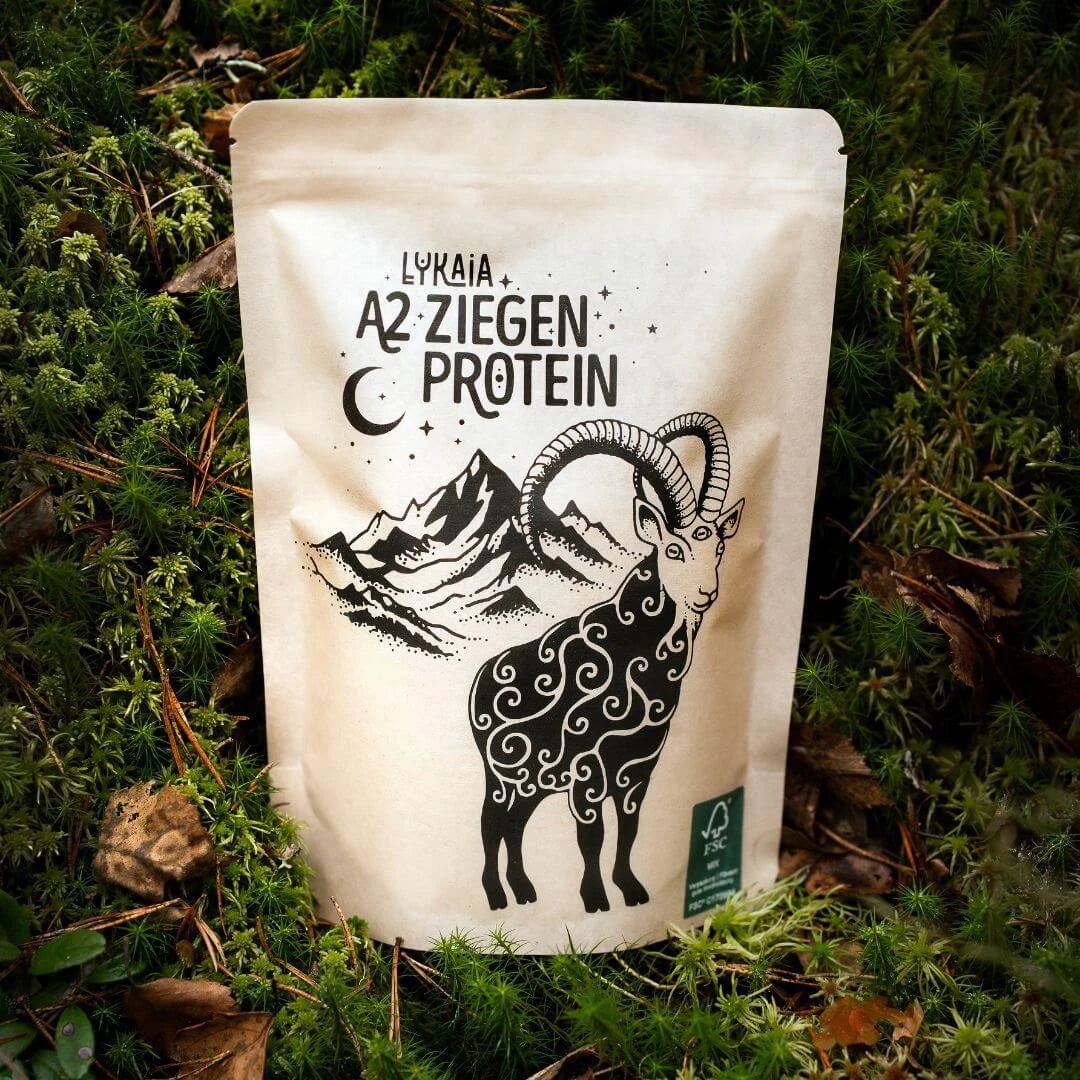Ashwagandha - What effect does the sleeping berry have?

The most important facts about Ashwagandha
Although Ashwagandha has only just arrived in the West, the plant has been known in the Indian health system of Ayurveda for over 3,000 years. Translated, Ashwagandha means something like “horse smell”, which might not sound so appetizing at first. And pure ashwagandha actually has a very bitter taste that takes some getting used to.
That's why we had some difficulties integrating it into our forest cocoa , which already contains a lot of bitter substances due to the Reishi. Thanks to the almost perfect sugar substitutes xylitol and glycine , we have still managed to create a good-tasting cocoa that doesn't taste like a horse at all and makes daily consumption easier.
In this article, we'll take a closer look at the plant to make it easier for you to decide whether you want to incorporate it into your daily routine.
What is the effect of Ashwagandha?
Ashwagandha works:
- Anxious
- Sleep-inducing
- Stress relieving
- Adaptogen
- Anti-inflammatory
- Increases thyroid hormones ft3 and ft4
The effect of ashwagandha on hormones:
The roots and leaves of the plant contain various active substances.
“Ashwagandha contains various alkaloids such as anaferine, anahygrin, cuscohygrin, nicotine , tropine and withasomnine. Also withanolides (“steroid lactones ”) such as somniferanolid, somniwithanolid, withaferin A and withasomniferanolid.”
Wikipedia
The hormonal effect of the Indian sleepberry is mainly due to the withanolides .
These act on the HPA axis in the brain.
The hypothalamus-pituitary-adrenal axis (HPA axis from English hypothalamus, pituitary gland, adrenal gland)
is also known as the stress axis. When we talk about resilience under stress, this is the key player. Because it regulates the physical reaction to stress.

Hypothalamus:
The hypothalamus is responsible for maintaining homeostasis , i.e. blood pressure, temperature and water balance. It therefore affects the
- Regulation of food and water intake
- Circadian rhythms and sleep
- Control of sexual and reproductive behavior
It also controls the release of hormones by the pituitary gland or produces the hormones itself .
Pituitary gland:
Also called the pituitary gland, it produces the majority of hormones for:
- growth
- Reproduction
- metabolism
Adrenal gland:
The English term adrenal gland already shows a function, namely the release of adrenaline.
The adrenal gland consists of the adrenal cortex and the adrenal medulla.
- produces steroid hormones such as cortisone
- is involved in water, mineral and sugar balance.
- produces “stress” hormones such as adrenaline , norepinephrine and cortisol
Ashwagandha acts on this axis at special GABA A receptors. We already know GABA from our glycine article ; it is the most important neurotransmitter when it comes to inhibiting activity in nerve cells. This is particularly important if you want to regenerate and relax or learn or remember something ( 1. ).
This influence was noticeable in randomized trials in which ashwagandha reduced stress better than a placebo ( 2. )
"Sixty adults were randomly assigned to receive either a placebo or 240 mg of a standardized ashwagandha extract once daily. Results were measured using the Hamilton Anxiety Scale (HAM-A), the Depression, Anxiety and Stress Scale-21 (DASS-21) and the hormonal changes in cortisol, dehydroepiandrosterone sulfate (DHEA-S) and testosterone."
Cortisol levels were significantly reduced in the ashwagandha group compared to the placebo group. The researchers continue to write:
"Ashwagandha use was also associated with greater reductions in morning cortisol and DHEA-S compared to placebo. Testosterone levels increased over time in men but not women."
How does Ashwagandha work for men?
Ashwagandha has a particularly beneficial effect on testosterone production in men ( 2. )
This is because the release of cortisol is curbed. What does cortisol have to do with testosterone?
This is illustrated by the following overview:

Ashwagandha has also been shown to improve sperm quality in infertile men. ( 3. )
An increase in muscle growth and generally better adaptation to strength training have also been shown in men specifically ( 4. ).
This is because this study was only carried out with men, but the effect is likely to be the same in women.
How does Ashwagandha work for women?
The balancing effect is also evident in women, for example by increasing FSH & LH levels.
More fertility hormones mean better hormonal balance in men and women. LH is a precursor to testosterone and, together with FSH, stimulates follicle formation in women.
During menopause, its use resulted in improvement in the following symptoms in an 8-week randomized, double-blind, placebo-controlled trial of 100 menopausal women ( 5. ):
- Irregular periods
- Hot flashes
- Sleep problems
- Mood swings
- Vaginal and bladder problems
- Declining fertility
- Changes in sexual function
- Bone loss
- Change in cholesterol levels.
Ashwagandha also lowers cortisol in women.
As you can see in the hormone overview above, it is just as important for women to have healthy testosterone levels. In fact, women also have more testosterone than estrogen.
However, fear of a sudden testosterone boost, especially in PCOS, due to ashwagandha is misplaced, because studies have clearly shown that the testosterone-increasing effect only occurs in men.
The anti-inflammatory effects of Ashwagandha
The anti-inflammatory effect is due to the fact that an enzyme called cyclooygenase ( COX ) is inhibited. This produces inflammatory substances, so-called prostaglandins ( 6. )In addition, there is a pain-relieving effect, as prostaglandins are also important for the sensation of pain.
How Ashwagandha works on the skin.
Ashwagandha has also been shown to increase collagen production ( 7. ) and counteract skin aging ( 8. ).
An inhibitory effect on collagenase activity (an enzyme that breaks down collagen) against the degradation of type I collagen has been reported, facilitating collagen stabilization.
Better sleep quality with Ashwagandha
Research shows that ashwagandha can help you fall asleep faster, sleep longer, and experience better sleep quality ( 9. ). After taking ashwagandha for six weeks, participants in one study described their sleep as, on average, 72% better ( 10 ).
Several compounds may be responsible for the sleep-promoting effects of ashwagandha. Researchers have suggested that triethylene glycol ( 11. ), naturally present in the plant, may promote sleepiness. Other researchers suspect that ashwagandha acts on GABA receptors, which play a key role in the sleep-wake cycle. There are probably other undiscovered connections.
Integrate Ashwagandha into your everyday life
If you are convinced of Ashwagandha, try our forest cocoa. We developed it specifically for relaxation and sleep and to make it easier to take Ashwagandha every day, because in its pure form it takes a lot of effort.
At just under 300mg per cup, our forest cocoa is exactly the dose used in most studies. These were done at 200-600 mg.
To the forest cocoa
Sources:
-
https://pubmed.ncbi.nlm.nih.gov/26068424/
Direct evidence for GABAergic activity of Withania somnifera on mammalian ionotropic GABAA and GABAρ receptors
-
https://pubmed.ncbi.nlm.nih.gov/31517876/
An investigation into the stress-relieving and pharmacological actions of an ashwagandha (Withania somnifera) extract: A randomized, double-blind, placebo-controlled study
-
https://pubmed.ncbi.nlm.nih.gov/30466985/
Withania somnifera (Indian ginseng) in male infertility: An evidence-based systematic review and meta-analysis
-
https://pubmed.ncbi.nlm.nih.gov/26609282/
Examining the effect of Withania somnifera supplementation on muscle strength and recovery: a randomized controlled trial
-
https://pubmed.ncbi.nlm.nih.gov/34553463/
Effect of an ashwagandha (Withania Somnifera) root extract on climacteric symptoms in women during perimenopause: A randomized, double-blind, placebo-controlled study
-
https://pubmed.ncbi.nlm.nih.gov/22713947/
Molecular docking studies of withanolides against Cox-2 enzyme
-
https://link.springer.com/article/10.1007/s12010-011-9326-8
Protective Effect of Withania somnifera and Cardiospermum halicacabum Extracts Against Collagenolytic Degradation of Collagen
-
https://pubmed.ncbi.nlm.nih.gov/34218546/
Collagen/glycosaminoglycan-based matrices for controlling skin cell responses
-
https://www.ncbi.nlm.nih.gov/pmc/articles/PMC7096075/
Efficacy and Tolerability of Ashwagandha Root Extract in the Elderly for Improvement of General Well-being and Sleep: A Prospective, Randomized, Double-blind, Placebo-controlled Study
-
https://pubmed.ncbi.nlm.nih.gov/32540634/
A randomized, double blind, placebo controlled study to evaluate the effects of ashwagandha (Withania somnifera) extract on sleep quality in healthy adults
-
https://pubmed.ncbi.nlm.nih.gov/28207892/
Triethylene glycol, an active component of Ashwagandha (Withania somnifera) leaves, is responsible for sleep induction
-
https://www.ncbi.nlm.nih.gov/pmc/articles/PMC3573577/
A Prospective, Randomized Double-Blind, Placebo-Controlled Study of Safety and Efficacy of a High-Concentration Full-Spectrum Extract of Ashwagandha Root in Reducing Stress and Anxiety in Adults
-
https://pubmed.ncbi.nlm.nih.gov/34858513/
Efficacy and Safety of Ashwagandha Root Extract on Cognitive Functions in Healthy, Stressed Adults: A Randomized, Double-Blind, Placebo-Controlled Study
0 comments







